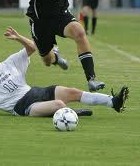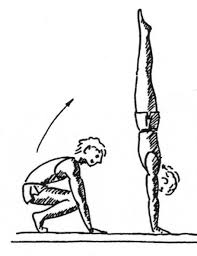 The junior football season is into its second month. New players have been accommodated, fresh playing positions tried out, coaching innovations introduced and the lethargy of some boys’ summer holidays run out of them.
The junior football season is into its second month. New players have been accommodated, fresh playing positions tried out, coaching innovations introduced and the lethargy of some boys’ summer holidays run out of them.
We parents are back in the swing, too. We’ve organised the car pool to share the burden of the trip to the training night held in another town. One Dad has taken on the mantel of coffee and bacon sarnie purchaser for Sunday morning fixtures. (Some parents will do anything to avoid putting up the goal-nets.) And we’re in good voice, too.
Our contingent won’t be shaming our sons with curses or referee criticism, but neither do our sons play in silence. There’s one phrase that you’ll hear uttered, bellowed or screeched more than any other. Our players may make a defence splitting pass, dive to save a certain goal or dribble around three opponents. But the words you’ll hear most frequently, encourage and celebrate another activity
Well in!
We most readily and energetically give our vocal support for a strong tackle. There are some sound football reasons for this. Tackling is evidence of commitment. It shows a young player’s determination to perform well and to play his (or her) part in the team. The youngster who rushes to confront and dispossess an opponent often appears to be immersed in the flow of the game. Their senses are focused on this game and nothing else, they are giving everything and inhabiting ‘the zone’. Nor should we forget that tackling is a skilful manoeuvre,
But there’s another perspective – we want our boys to act like little men.
I have a theory that accounts for some, although certainly not all, of this particular touchline behaviour. Many dads, I believe, find it difficult to associate with their young sons, who seem effeminate. Their infant boys play with teddies and toy animals, slides and swings. I have sometimes seen these dads with their nursery age children at the local swimming pool. Their sons cling to the pool’s edge or hesitate on the side, fearful of the water that would cover their head, although it laps at their father’s midriff. A few minutes of quiet persuasion test the Dad’s patience and soon he’s rebuking the boy for wasting his time, for cowardice.
But once they are in a football team, with Dad following from the touchline, the father-son connection can be made. And those dads don’t want a soft lad, but one who gets stuck in and shows the kind of physical bravery that the Dad can be proud of, can ruffle their boy’s hair in appreciation of afterwards.
It is axiomatic that a boy that goes down injured on the field shouldn’t be pitied or sympathised with by his Dad. I still marvel at the experience of standing beside PartyDad at an indoor practice seven years ago. His young son sprinted in front of us, was tripped when moving at full pelt, slapped into the leisure centre floor, sprawled and skidded. PartyDad didn’t react: not a comment about the fall, the boy who tripped his son, he didn’t even flinch at the moment of impact.
I remember no.1 son getting a boot in the face at a game once and trying to joke that he’d been complaining none of his teeth were falling out, so this should sort it out for him. It’s not just a lack of pity that’s shown. The boy who cries because of the pain, the cold or the shock of a collision is “soft” – not hurt, upset or frightened.
There is probably a solution to this nonsense, though. It’s Touchline Mums, who (without running onto the pitch to comfort their injured progeny) not only see when a child is in pain or scared, but aren’t reluctant to remind their menfolk how they bleat like sheep when they suffer a cold, an in-growing toenail or even a hangover.




